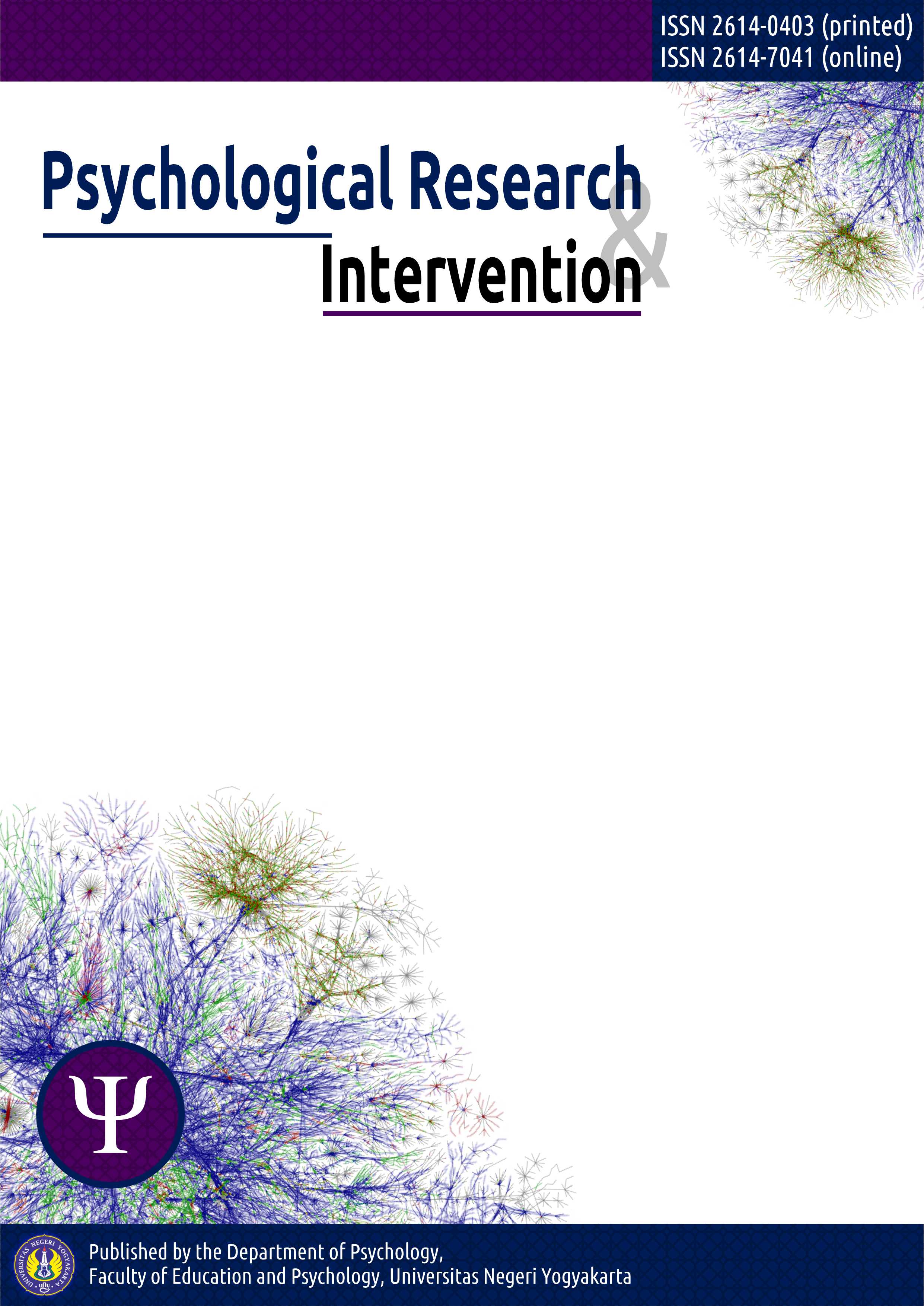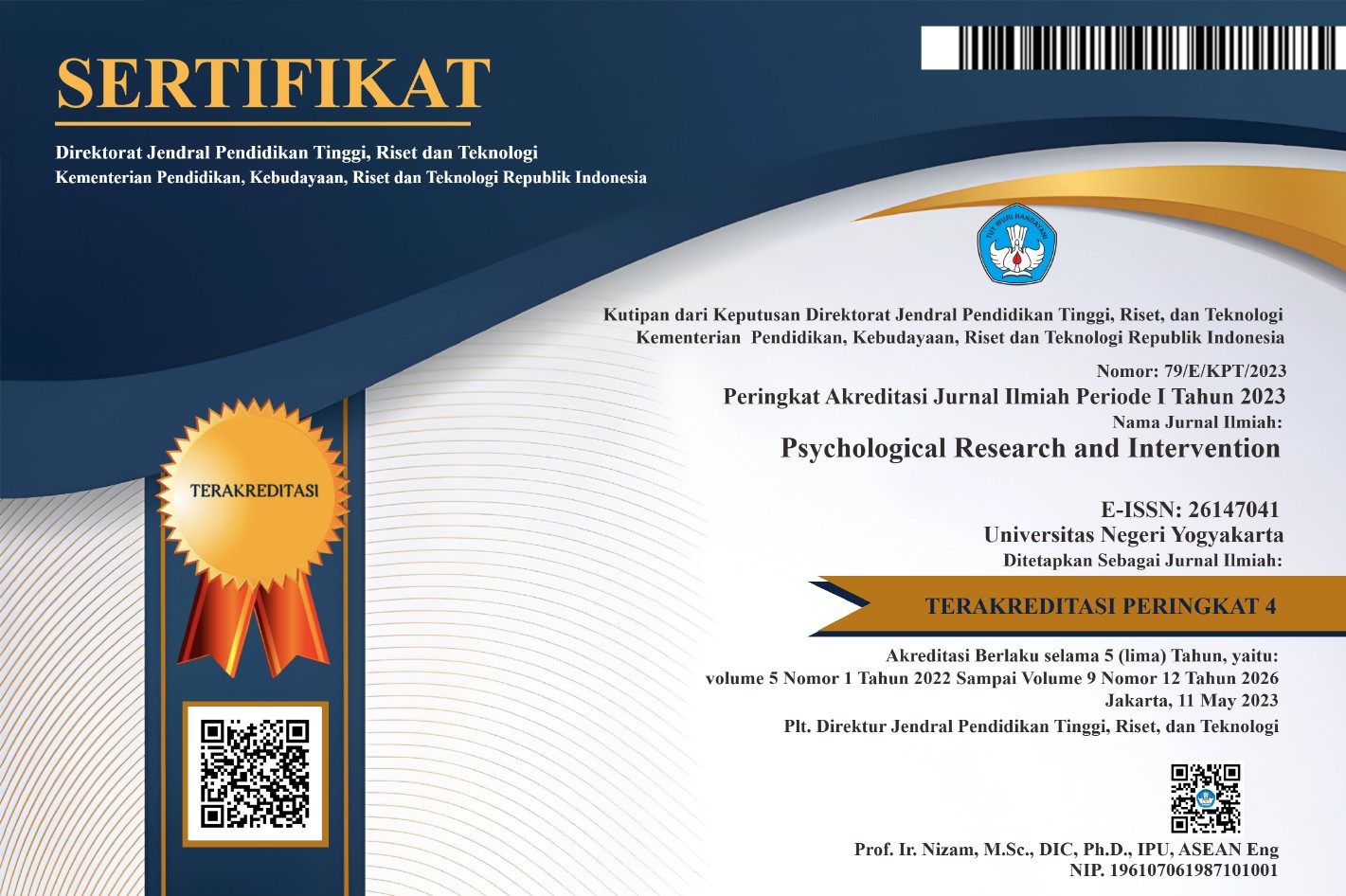Psychological meaningfulness at work as a mediator of job characteristic and job attachment in public elementary schools in Yogyakarta
DOI:
https://doi.org/10.21831/pri.v1i2.21324Keywords:
work engagement, job characteristics, psychological meaningfulness, path analysisAbstract
This study aims to determine the relationship between job characteristics toward work engagement through the mediating psychological meaningfulness. Subjects in this study were a primary school teacher in Yogyakarta who totaled 132 (N=132) of teachers. Our data was collected using the work engagement scale (vigor, dedication, and absorption), job characteristics scale (skill variety, task identity, task significance, autonomy, and feedback), and psychological meaningfulness scale (meaningful work, others around the work environment, the work context, and spiritual life) "” the methods of data analysis used path analysis techniques developed from regression analysis. Results of path analysis indicated that indirect effect was significant (p2 0.332 x 0.332 = 0.110) and the direct effect of 0511. Therefore, the total effect of the work engagement is direct and indirect effect that is 0.511 + 0.110 = 0.621 (62.1%). This means that hypotheses were accepted, there is a correlation between job characteristics toward work engagement through psychological meaningfulness as a mediator, where the suitability of job characteristics will improve work engagement through psychological meaningfulness as a mediator, where the suitability of job characteristics will improve work engagement through psychological meaningfulness that also higher on the teacher.
References
Agung, P. (2003). Pengaruh kompensasi dan karakteristik perkerjaan terhadap kepuasan kerja karyawan unit produksi PT. X Palembang. Jurnal Manajemen & Bisnis Sriwijaya, 1(2), 1-21.
Agustian (2012). Pengaruh kompensasi, status/pengakuan, dan kesempatan berkembang terhadap tingkat employee engagement pada karyawan Universitas Sanata Dharma. Tesis (tidak diterbitkan). Yogyakarta: Magister Manajemen Universitas Gadjah Mada.
Arnold, K. A., Turner, N., Barling, J., Kelloway, E.K., & McKee, M.C. (2007). Transformational leadership and psychological well-being: The mediating role of meaningful work. Journal of Occupational Health Psychology, 1(12), 193-203.
Azwar, S. (2010). Penyusunan skala psikologi. Yogyakarta: Pustaka Pelajar.
Azwar, S. (2011). Reliabilitas dan validitas. Yogyakarta: Pustaka Pelajar.
Azwar, S. (2011). Tes prestasi. Yogyakarta: Pustaka Pelajar.
Bakker, A. B., Schaufeli, W. B., Leiter, M. P., & Taris, T. W. (2008). Work engagement: An emerging concept in occupational health psychology. Journal of Organizational Behavior, 1 (22),187-200.
Bakker, A. B., Schaufeli, W. B., Leiter, M. P. (2010). Work engagement: A handbook of essential theory and research. Psychology Press.
Bakker, A. B., Tims, M., Derks, D. (2012). Proactive personality and job performance: The role of job crafting and work engagement. Human Relations, 6(10), 1359-1378.
Bakker, A. B. & Xanthopoulo, D. (2013). Creativity and charisma among female leaders: The role of resources and work engagement. Journal of Human Resource Management, 24(14), 2760-2779.
Djastuti, I. (2011). Pengaruh karakteristik pekerjaan terhadap komitmen organisasi karyawan tingkat managerial perusahaan jasa konstruksi di Jawa Tengah. Jurnal Bisnis dan Akuntansi, 13(1), 1-19.
Ghozali, I. (2007). Aplikasi analisis multivariate dengan program SPSS. Semarang: Badan Penerbit Univeristas Diponegoro.
Hackman, J. R., Oldham, G., Janson, R., & Purdy, K. (1975). A new strategy for job enrichment. California Management Review, 17(4), 1-57.
Indrianti, R. & Hadi, C. (2012). Hubungan antara modal psikologis dengan keterikatan kerja pada perawat di instalasi rawat inap rumah sakit jiwa Menur Surabaya. Jurnal Psikologi Industri dan Organisasi, 1(3), 120- 125.
Isaksen, J. (2000). Constructing meaning despite the drudgery of repetitive work. Journal of Humanistic Psychology, 1(40), 1-16.
Kahn, W. A. (1990). Psychological conditions of personal engagement and disengagement at work. Academy of Management Journal, 33(4), 692-724.
Lightsey, O., & Boyraz, G. (2011). Do positive thinking and meaning mediate the positive affect: life satisfaction relationship?. Canadian Journal Science, 43(3), 210-218.
Lockwood, N. R. (2007). Leveraging employee engagement for competitive advantage, SHRM research briefly stated, retrieved from http://www.shrm.org.htm on 15 December 2014
Maslach, C., Schaufeli, W. B., & Leiter, M. P. (2001). Job burnout. Annual Review Of Psychology, 1(52), 397–422.
Maslach, C., Schaufeli, W. B., & Leiter, M. P. (2008). Early predictors of Job Burnout and engagement. Journal of Applied Psychology, 93(3), 498–512.
May, D. R., Gilson, R. L., & Harter, L. M. (2004). The Psychological conditions of meaningfulness, safety, and availability and the engagement of the human spirit at work. Journal of Occupational and Organizational Psychology, 77(1), 11-37.
Munandar, A. S. (2001). Psikologi industri dan organisasi. Tangerang: UI Press.
Oliver, A. L., & Rothmann, S. (2007). Antecendent of work engagement in a multinational oil company. SA Journal of Industrial Psychology, 33(3), 40-56.
Robbins, S. P. & Judge, T. A. (2011). Perilaku organisasi: Organizational behavior. Jilid 1. (12th ed). Jakarta: Salemba Empat.
Robbins, S. P. & Judge, T. A. (2011). Perilaku organisasi: Organizational behavior. Jilid 2. (12th ed). Jakarta: Salemba Empat.
Robinson, I. (2006). Human resouce management in organization. London, England: CIPD
Rosso, B. D., Dekas, K. H., & Wrzesniewski, A. (2010). On the meaning of work: A theoretical integration and review. Research in Organizational Behavior, 1(30), 94-120.
Rothmann, S. (2010). Factor associated with employee engagement in South Africa. SA Journal of Industrial Psychology, 36(2), 1-12.
Rothmann, S. & Welsh, C. (2013). Employee engagement: The role of psychological conditions. Management Dynamics, 22(1), 1-120.
Rothmann, S. (2013). Callings, work role fit, psychological meaningfulness and work engagement among teachers in Zambia. South African Journal of Education, 33(2), 1-16.
Rusnawati, V. (2013). Peran kepemimpinan kepala sekolah dalam upaya meningkatkan disiplin kerja guru pada SDN 018 Balikpapan. Jurnal Administrasi Negara, 1(2),1-19.
Saks, A. M. (2006). Employee engagement: Antecendents and consequences. Journal of Managerial Psychology, 1(21), 600-619.
Schaufeli, W. B., & Bakker, A. B. (2004). Job demands, job resources, and their relationship with burnout and engagement: A multi-sample study. Journal of Organizational Behavior, 1(25), 410-427.
Schaufeli, W. B. (2012). Work engagement. What do we know and where do we go?. Journal of Applied Psychology,14(01), 3-10.
Schaufeli, W. B., Martinez, I. M., Pinto, A. M., Salanova, M., & Bakker,A. B. (2002a). Burnout and engagement in university students: Across-national study. Journal of Cross-Cultural Psychology, 1(33), 464-481.
Schaufeli, W. B., Martinez, I. M., Pinto, A. M., Salanova, M., & Bakker, A. B. (2002). The Measure of engagement and burnout: A confirmative analysis approach. Journal of Happines Studies, 3(1), 701-716.
Schaufeli, W. & Bakker, A. (2003). Utrecht work engagement scale, Preliminary Manual Version 1. Occupational Health Psychology Unit.
Schaufeli, W. B. & Bakker, A. B. (2009). How changes in job demands and resources predict burnout, work engagement, and sickness absentieeism. Journal of Organizational Behavior, 1(30), 1-15.
Schaufeli, W. B. & Salanova, M. (2007). Work engagement: an emerging psychological concept and its implication for organization. Managing Social and Ethnical Issue in Organization, 1(5), 78-90.
Schueller, S. & Seligman,M. (2010). Pursuit of pleasure, engagement, and meaning: Relationship to subjective and objective measures of well-being. The Journal of Positive Psychology, 5(4), 1-17.
Schultz, D. & Schultz, S. E. (1990). Employee Psychology and industry today: An introduction to industrial and organizational psychology (5th ed.). New York, NY: Maxwell MacMillan.
Steer, R. M & Porter, L. W. (1983). Motivation and work behaviour (3rd ed.). New York, NY: McGraw-Hill.
Steger, M. F. & Dik, B. J. (2009). If one is searching for meaning in life, does meaning in work help? Journal of Applied Psychology: Health and Well-Being, 1(1), 301-320.
Steger, M. F., Dik, B. J. & Duffy, R.D. (2012). Measuring meaningful work: The work and meaning inventory (WAMI). Journal of Career Assessment, 1(0), 1-16.
Sungkit, F. N. (2014). Pengaruh job enrichment terhadap employee engagement melalui psychological meaningfulness sebagai mediator. Thesis (Unpublished). Yogyakarta: Magister Profesi Psikologi Universitas Gadjah Mada.
Taniredja, T. & Mustafidah, H. (2012). Penelitian kuantitatif. Bandung: Alfabeta.
Van Zyl, L. E., Deacon, E., & Rothmann, S. (2010). Towards happiness: Experiences of work-role fit, meaningfulness and work engagement of industrial organizational psychologists in South Africa. SA Journal of Industrial Psychology, 36(1), 1-14.
Wolf, S. (2010). Meaning in life and why it matters. Princeton, NJ: University Press.












